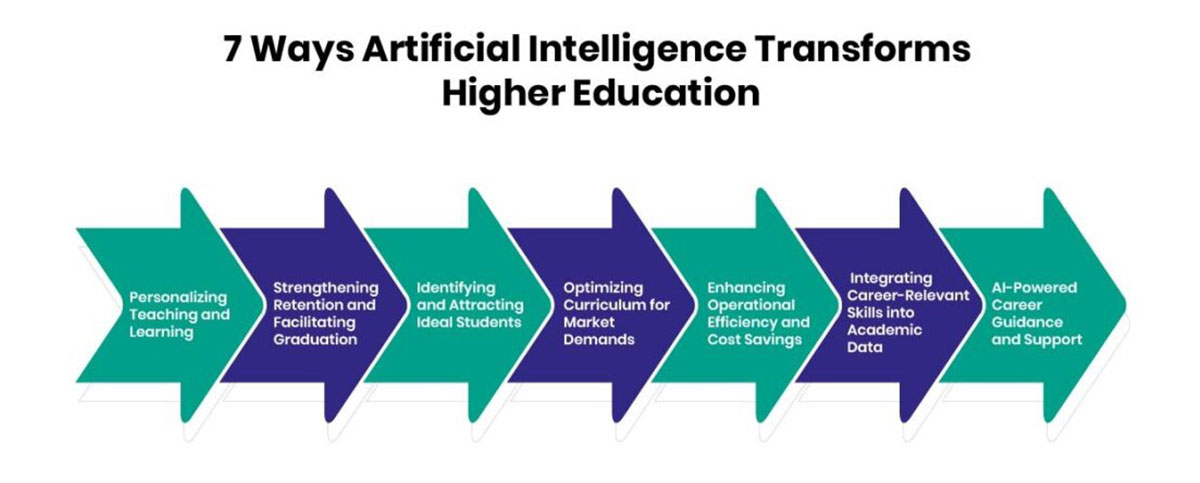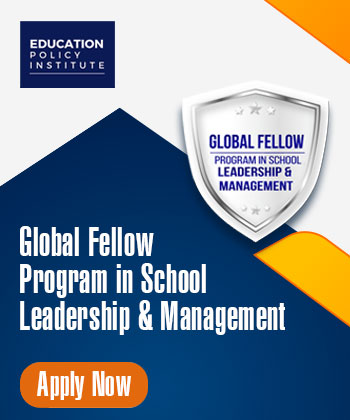Artificial Intelligence - Redefining Higher Education in 7 Ways
June 14, 2024The last few years have been a whirlwind of change for higher education institutions. Between the rapid rise of artificial intelligence (AI) technologies and digitalization, colleges and universities operate differently than they did just a decade ago. AI is not just a buzzword; it’s a game-changer revolutionizing every aspect of our lives, including education.
In this fast-paced era of technological advancements, AI is reshaping the learning landscape in remarkable ways. From personalized learning experiences to intelligent tutoring systems, AI is transforming how students learn and how educators teach. As universities struggle to remain relevant and prove their worth, they face a critical choice: embrace this new paradigm or risk becoming obsolete in a reality where automation and the democratization of knowledge dominate.
The impact of AI on higher education over the next five years will be profound. AI technologies will continue to evolve, providing more sophisticated tools for learning and teaching. Colleges and universities must adapt to these changes, integrating AI into their curricula and operations to stay ahead in an increasingly competitive educational landscape. As we navigate this transformative journey, the goal is to cultivate a new generation of leaders prepared for the AI revolution and committed to using technology ethically and responsibly for the betterment of society.
7 Ways Artificial Intelligence Transforms Higher Education
Higher education is undergoing a profound transformation driven by artificial intelligence (AI). As AI becomes deeply embedded in our daily lives, universities must evolve to prepare students for an AI-driven world. Integrating AI into curricula, admissions, and administration can enhance educational outcomes and operational efficiency.

-
Personalizing Teaching and Learning
Artificial intelligence (AI) is revolutionizing personalized teaching and learning, transforming education from a one-size-fits-all approach to a tailored experience that meets individual needs. AI algorithms analyze data about students, including their academic performance, learning preferences, and interests. This information helps create customized learning paths that adapt and grow with each student, ensuring they receive the support and challenges they need to succeed.AI-powered intelligent tutoring systems act as virtual mentors, providing personalized feedback and explanations. These systems break down complex concepts into manageable chunks and offer alternative approaches to enhance understanding. They also track student progress, adjusting the difficulty level and providing real-time assessments to foster efficient learning.
Adaptive learning technologies further personalize the interaction between students and educational material. These systems guide learners based on their unique needs and preferences, ensuring a more engaging and effective learning experience. Virtual tutors, available 24/7, provide support whenever students need it, helping to overcome the limitations of traditional classroom settings.
-
Strengthening Retention and Facilitating Graduation
When students are well-matched with the universities they attend, retention rates improve. But it's not that simple, and students might drop out for any number of reasons. AI tools aid with academic advising, predicting when students might fail or drop a course, alerting faculty and staff before problems arise. Students with concerns about financial aid, advising, and career opportunities can receive around-the-clock counseling from AI chatbots. Virtual assistants can help students manage their mental health, such as Woebot, which enables students to explore their emotions with "intelligent mood tracking."AI tools also support students with learning difficulties by identifying patterns consistent with specific challenges and making assignments and exams more tailored and accessible. Identifying early warning signs can help universities assist struggling students and help them persist toward graduation.
-
Identifying and Attracting Ideal Students
College admissions have evolved into a scenario marked by significant disparities. Selective universities have grown even more selective, with acceptance rates falling into the low single digits at some institutions. On the other hand, many small private colleges and regional publics are struggling to fill their classes. So, universities will have to employ even more sophisticated enrollment management strategies to fill their classes. Thankfully, AI can help.Chatbots provide immediate, personalized responses to inquiries and help students navigate the application process. Predictive analytics help admissions officers prioritize students who demonstrate sincere interest and are most likely to enroll, calculate the amount of financial aid students need, and estimate the probability they will graduate. AI-powered tools like Element451 use behavioral data to rate students' potential for success. AI algorithms can also sift through mountains of applications, sorting for grades, test scores, and extracurricular activities, saving overtaxed staff time and effort. Once students are admitted, AI tools persuade students to submit deposits and enroll. AI also assists with processing visas, student housing assignments, and course registration, all customized for each student.
-
Optimizing Curriculum for Market Demands
AI poses a threat to not only the methods of teaching but also the content being taught, with emerging market realities potentially driving significant changes to college curricula. The World Economic Forum projects AI will create 97 million jobs by 2025 while also anticipating 85 million jobs lost due to AI. Universities must adapt their curricula to align with these market changes. Fields like journalism, graphic design, nursing, and language studies might see significant transformations.At the same time, the AI industry presents almost unlimited opportunities for jobs and degrees. Universities have responded to market demands and student interests with MBA concentrations and undergraduate programs in AI. As the curriculum shifts to embrace an AI world, disciplines fostering creative thinking and ethical considerations will become increasingly important.
-
Enhancing Operational Efficiency and Cost Savings
College costs have nearly tripled over the past 50 years, driven in part by administrative bloat. AI could help stem tuition increases through greater efficiencies. By streamlining administrative functions across admissions, financial aid, marketing, student health services, IT, tutoring centers, and career services, AI could enable universities to pare down staffing and reduce costs. AI can help automate repetitive and rule-based tasks, freeing up valuable time for administrators and staff to focus on strategic initiatives. -
Integrating Career-Relevant Skills into Academic Data
Utilizing AI to integrate career-relevant skills into academic data offers students a strategic advantage in their professional pursuits. By analyzing academic performance and identifying areas of strength and improvement, AI algorithms can recommend customized learning pathways that prioritize the acquisition of skills sought after by employers. These recommendations can include targeted courses, projects, internships, and extracurricular activities that align with students' career goals. By incorporating real-world relevance into their academic journey, students are better equipped to meet the demands of the job market and achieve success in their chosen fields. -
AI-Powered Career Guidance and Support
AI-driven career guidance and support harness the power of artificial intelligence to provide students with personalized insights into potential courses and career trajectories. By analyzing academic performance, individual interests, and prevailing labor market trends, institutions can offer informed guidance to help students navigate their academic paths more effectively. This personalized approach not only enhances student satisfaction but also contributes to higher retention rates, ensuring that students remain engaged and motivated throughout their educational journey.
Conclusion
As artificial intelligence continues to redefine higher education, institutions must embrace its transformative potential to stay relevant in an ever-evolving landscape. Embracing AI innovations not only fosters academic excellence but also equips graduates with the skills and knowledge needed to thrive in the rapidly changing global economy. As we navigate this exciting frontier, collaboration between various stakeholders of the society will be essential to ensure that AI serves as a catalyst for positive change in higher education.




